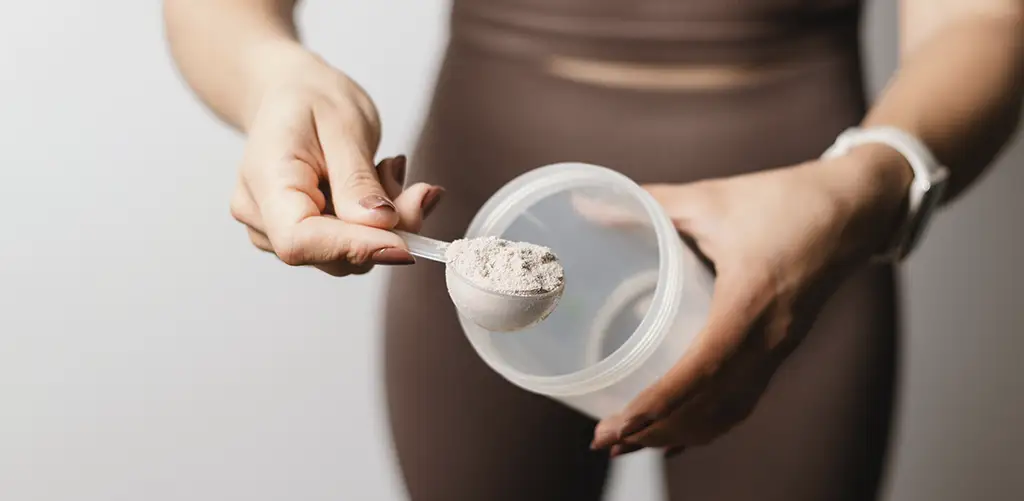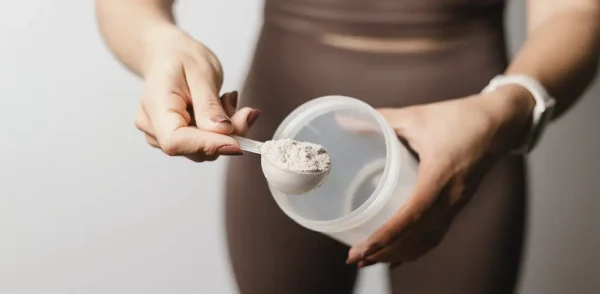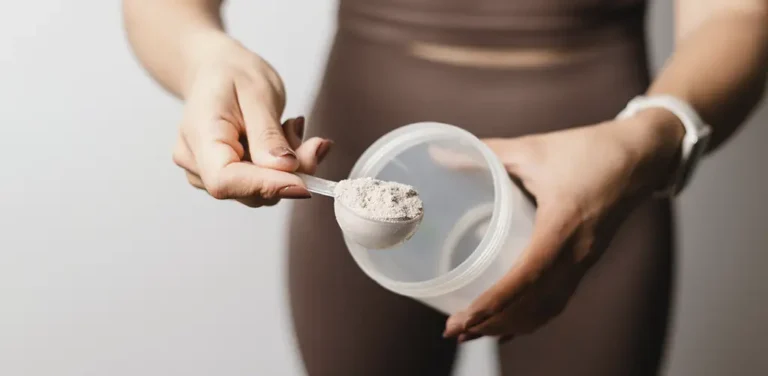
table of contents
Maybe you’re already adding a scoop to your shaker before the gym — or maybe you’ve just heard the buzz and are wondering if creatine is really worth a spot on your supplement shelf. Fact is that creatine is one of the most talked-about supplements today, and for a good reason.
For years, creatine was mostly about muscle. But recent studies suggest it may also improve memory and processing speed, especially when the brain is under pressure.
The newest evidence even suggests there might be benefits for women across different life stages, from PMS and postpartum to menopause, with promising links to mood, energy, and bone health.
In this blog, we’ll look into creatine’s impact on energy, strength, cognition, and women’s health. How to use creatine, what research really says about creatine safety, and where it fits in a long-term health plan.
Creatine function and bioavailability
Creatine is made in the body from the amino acids arginine, glycine, and methionine.
Most of it is stored in your muscles, with smaller amounts in the brain.
To better understand the science and to decide if extra supplementation is needed, we’ll look at what creatine actually does in the body, and how much you can realistically get from food.
What creatine does in the body
Creatine works like a quick-charge battery. Your muscles run on ATP – the molecule that fuels every movement. During hard exercise, those energy stores drain fast.
Creatine helps refill ATP almost instantly, giving your muscles the fuel they need to push harder and last longer in short, intense bursts like sprinting or lifting weights. Since your body only keeps a small creatine supply, supplements can help top it up.
So creatine isn’t, like protein powder, a supplement that directly builds muscle mass. Instead, it fuels your muscles with more energy, allowing them to perform better. Over time, that improved performance can lead to greater training progress and, indirectly, more strength and muscle growth.
How much creatine do you get from food?
Your diet determines how much creatine you get from food. The richest natural sources are meat and fish, since creatine is stored in the muscles of animals. Plants contain little to none.
A normal meal with creatine-rich foods only adds a small amount, far below the 3–5 grams per day that have long been used in research. That’s why many people take supplements, especially if they don’t eat much animal protein.
These are the most common creatine sources in everyday diet*:
- Herring
- Pork
- Beef
- Salmon
- Tuna
- Cod
- Chicken
* Exact creatine levels per 100 g can vary, and cooking further lowers the amount, since heat converts some into creatinine — often by 10–30%.
Creatine supplementation — doses, research and forms
For decades, most advice has centered around 3–5 g of creatine per day. That’s the amount used in older studies and it’s easy for most people to tolerate without digestive issues. But newer research is starting to question whether this standard dose is enough — especially if the goal is brain health, cognition, or even sleep support.
Recent studies suggest that to meaningfully affect the brain, you may need 10 g or more per day. A narrative review on brain energy metabolism found that the highest doses, typically 20 g or more for shorter periods, are consistently linked to measurable increases in brain creatine stores.
A dose–response analysis also concluded that in healthy young adults, it was mainly protocols with ~20 g/day for 7–28 days that reliably raised brain creatine levels.
What Dr. Rhonda Patrick says about creatine
Dr. Rhonda Patrick, a biomedical scientist known for her work on nutrition, aging, and brain health, has pointed out this shift as well. She often makes complex research accessible to a wider audience and has highlighted creatine’s potential beyond muscle performance.
While 3–5 g daily is still a solid starting point for muscle health, she notes that athletes and those seeking neurological benefits may need 10 g or more to see meaningful changes. At the same time, she stresses the importance of balancing potential benefits with personal tolerance and the practical side of taking larger amounts.
Timing?
The evidence doesn’t demand a strict clock. Consistency matters more in creatine supplementation than “before or after workout,” and both approaches can work; choose the time you’ll stick with. Many people pair it with a meal if their stomach is sensitive.
| Daily creatine dose | What research suggests happens | Typical purpose |
|---|---|---|
| 3–5 g | Maintains muscle creatine stores. Improves strength, recovery, and performance in training. | Muscle health & performance |
| ~10 g | May begin to influence brain function. Some evidence for better memory, focus, and cognition under stress or sleep loss. | Brain support & cognition (emerging) |
| ~20 g (short term) | Most consistent increases in brain creatine. Used in research for 1–4 weeks or as a muscle-loading phase. | Research protocols, brain energy metabolism, fast muscle saturation |
Benefits of creatine
Creatine is best known for boosting physical performance, but the science shows it doesn’t stop there. Beyond supporting strength and recovery, research points to roles in brain health and even unique benefits for women across different life stages.
Here are some of the areas where creatine has been studied the most:
Creatine for muscle and workout
Creatine won’t turn you into a bodybuilder overnight. What it really does is help your muscles recycle ATP — the body’s main energy currency — during short bursts of effort. That extra energy means you can push harder, lift heavier, and recover faster in high-intensity training.
Studies consistently show that supplementation improves strength, muscle mass, and workout performance. A meta-analysis of more than 20 trials found greater gains in both lean mass and one-rep max strength among creatine users compared to non-users.
Creatine and the brain during sleep deprivation
A 2024 study investigated the effects of creatine on young adults who were kept awake for almost a full day. Participants received either a single high dose of 0.35 g/kg body weight (about 25–30 g for an average person) or a placebo.
Findings showed:
- Those who received creatine performed better on memory and reaction tests, even under fatigue.
- MRI scans revealed that brain energy levels were more stable, suggesting creatine helped counter the drop in energy usually seen with sleep deprivation.
- Participants also reported feeling less tired compared to the placebo group, which could have practical relevance in situations of sleep loss.
Creatine and cognitive function
A meta-analysis from 2024 published in Frontiers in Nutrition combined data from 16 clinical trials including a total of 492 adults. The researchers examined the effects of longer-term creatine supplementation on different aspects of cognitive function.
Findings showed:
- A clear improvement in memory across several studies.
- Better attention span, meaning participants were able to maintain focus for longer.
- Faster processing speed, suggesting that the brain works more efficiently with creatine.
- No significant effect on overall cognition or more complex executive functions, indicating that benefits may be limited to specific domains.
- Stronger effects were observed in women, younger adults, and individuals with health challenges.
Summary
Creatine isn’t just for muscles – it can also give the brain an extra boost when under pressure. Research shows that creatine may support the brain both during sleep deprivation and with longer-term supplementation. The effects are most noticeable in memory, reaction time, and processing speed, while more complex cognitive functions seem to be less affected.
Creatine for women
Creatine research is increasingly focusing on women, and the findings are encouraging.
A 2025 clinical trial in women going through the menopausal transition reported improvements in muscle strength, energy metabolism, and even markers of cognitive health after creatine supplementation.
The researchers suggested that creatine could help offset some of the physiological challenges linked to lower estrogen levels.
Estrogen
During menopause, estrogen levels naturally decline. This can make muscles and bones weaker, reduce the cells’ ability to produce energy efficiently, and increase the risk of cognitive changes. Creatine may help support these areas.
Side effects of creatine
Creatine has one of the strongest safety profiles of any supplement. Long-term studies show that 3–5 g per day is well tolerated in both men and women, with no evidence of harm to healthy kidneys or liver.
When it comes to higher doses, research suggests that ~10 g per day for several weeks is generally well tolerated, though mild stomach upset, like bloating or cramps can occur, especially if taken on an empty stomach.
Studies using ~20 g per day for 1–4 weeks (after something called a creatine loading phase) also report good overall safety, but gastrointestinal issues are more common unless the dose is split across the day and taken with food.
The most frequent side effects at any dose are mild digestive problems and temporary water retention, which can cause slight weight gain. Rare complaints include headaches or a “dry” feeling, usually linked to not drinking enough water. Importantly, clinical studies have not found creatine to increase risks of kidney or liver damage in healthy adults.
Special groups such as people with kidney disease, pregnant women, or those breastfeeding should avoid supplementation unless under medical supervision.
Is creatine something for you?
If you’ve always thought creatine was only for guys at the gym chasing bigger muscles, hopefully we’ve shifted that picture a little. Yes, it’s well documented for strength, energy, and recovery – but research shows it goes further than that. Creatine may also support your brain when you’re tired, stressed, or sleep-deprived, and there’s growing evidence that it could play a role in women’s health across life stages – from energy and training outcomes to menopause, mood, and mental clarity.
That makes creatine one of the most exciting supplements right now. Not just because it’s among the most researched and safest out there, but because it shows promise in areas where so many people struggle in everyday life: energy, body, brain, and balance.
So if you’ve dismissed creatine in the past thinking “it’s not for me,” it may be time to take another look.
You won’t turn into a bodybuilder overnight, but you might find a supplement that supports multiple functions in your body and gives you that extra boost right where you need it most.
Purovitalis tip
Give creatine a try and see how your body and mind respond.
Pay attention to your energy, your workouts, your focus – even your recovery after a tough day.
Everyone’s different, and the only way to know if creatine deserves a permanent spot on your supplement list is to experience it for yourself.
References
- Kreider RB, Kalman DS, Antonio J, Ziegenfuss TN, Wildman R, Collins R, et al. International Society of Sports Nutrition position stand: safety and efficacy of creatine supplementation in exercise, sport, and medicine. J Int Soc Sports Nutr. 2017;14:18.
- Gordji-Nejad A, Matusch A, Kleedörfer S, Patel HJ, Drzezga A, Elmenhorst D, et al. Single dose creatine improves cognitive performance and induces changes in cerebral high-energy phosphates during sleep deprivation. Sci Rep. 2024;14:4937.
- Xu C, Bi S, Zhang W, Luo L. The effects of creatine supplementation on cognitive function in adults: a systematic review and meta-analysis. Front Nutr. 2024;11:1424972.
- Rae CD. Dose–response of creatine supplementation on cognitive function in healthy young adults. Brain Sci. 2023;13(9):1276.
- Antonio J, Ciccone V. The effects of pre- versus post-workout supplementation of creatine monohydrate on body composition and strength. J Int Soc Sports Nutr. 2013;10:36.
- Kreider RB, Jagim AR, Purpura M. Bioavailability, efficacy, safety, and regulatory status of creatine and related compounds: a critical review. Nutrients. 2022;14(5):1035.
- Poortmans JR, Francaux M. Long-term oral creatine supplementation does not impair renal function in healthy athletes. Med Sci Sports Exerc. 1999;31(8):1108-10.
- Brosnan JT, Brosnan ME. The role of dietary creatine. Amino Acids. 2016;48(8):1785-91.
- Burke DG, Candow DG, Chilibeck PD, et al. Creatine: a sports medicine review of its development, physiologic mechanisms, and application to training and performance. Curr Sports Med Rep. 2023;22(5):149-59.
- Smith-Ryan AE, Cabre HE, Eckerson JM, Candow DG. Creatine supplementation in women’s health: a lifespan perspective. Nutrients. 2021;13(3):877.
- Chilibeck PD, Candow DG, Gordon JJ, Duff WRD, Mason R, Shaw K, et al. Two-year randomized controlled trial of creatine supplementation combined with exercise on bone health in postmenopausal women. Med Sci Sports Exerc. 2023;55:1750-60.
- Candow DG, Moriarty T. Effects of creatine monohydrate supplementation on muscle, bone and brain—hope or hype for older adults? Curr Osteoporos Rep. 2024;23(1):1-12.

Track 50+ health metrics with AI-powered accuracy. Start your free trial today and take control of your wellness journey!

longevity tips best exercises nutrition diets healthy lifestyle
The art of living well a life that’s not measured by years alone, but by experiences, health, and joy!













